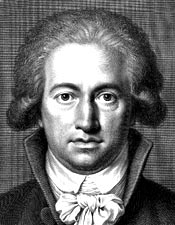Johann Wolfgang von Goethe, born on 28 August 1749 in Frankfurt, was a multifaceted German literary and scientific figure. His vast body of work spans poetry, drama, literature, theology, humanism, and science. Regarded as one of the preeminent figures in German literature, Goethe’s influence extended to Western philosophical and political thought.
Goethe’s early life in Frankfurt was marked by a comprehensive education, fostering a profound interest in literature and the arts. His novel “The Sorrows of Young Werther” (1774) epitomised the Sturm und Drang literary movement and brought him instant fame.
In 1775, Goethe moved to Weimar, where he became a central figure in the Duke of Weimar’s court and engaged in diverse administrative, scientific, and literary activities. His Weimar period was marked by a prolific output, including major works like “Wilhelm Meister’s Apprenticeship”, and his involvement in the Weimar Classicism movement alongside Schiller and others.
Goethe’s scientific pursuits were as notable as his literary contributions, particularly in the fields of botany, morphology, and colour theory. His approach to science was phenomenological, focusing on direct observation and experience. His later literary works evidence his embrace of Classicism, and a turning away from Romanticism.
Goethe’s works, especially “Faust,” his most famous drama, have inspired countless adaptations in various artistic forms. His philosophical and aesthetic ideas continued to influence thinkers and artists long after his death on 22 March 1832, in Weimar. His legacy endures as a major figure in the transition from Enlightenment rationalism to Romantic subjectivism and beyond.
More by this author
